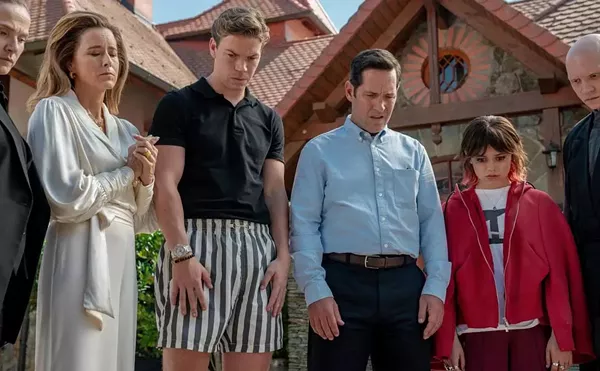Midsommar (pronounced "midsummer") is a cool, coy, and self-conscious movie, less an overt horror work than a young man's art film with some vivid gore splashed throughout it.
The premise finds its central couple, Dani (Florence Pugh) and Christian (Jack Reynor) locked together romantically as the former is beset by grief in the wake of a recent tragic event. When Christian decides to accompany a group of male friends on an anthropology research trip to a colleague's remote Swedish commune, Dani tags along after extracting an invitation, straining her beau's role as a reluctant lifeline in a time of need. Once there, they find their colleague, Pelle (a native Swede), has not accurately prepared them for the eerie, ancient, and often savage rituals they'll witness there — or for their expected roles within them.
Though it's only Ari Aster's first feature since Hereditary, his divisive (and thus successful) hit debut, a set of unifying thematic interests has already emerged in his small body of work. Among them: a fascination with offbeat ritual and tradition, a fixation on observing if not anatomizing grief, a healthy skepticism toward the relationships that bind us as families, couples, and, let's say, societies. Formally, it approaches these elements much like Hereditary, albeit in much brighter summer light. Alternating between close-ups on actorly performances and wide, flat, and minimally furnished compositions that make near-camp comedies of his film's own histrionic dramas, his focus has thus far been steadily on drilling through the late stages of fragile human relationships, positioning its characters like marionettes.
But therein lies the problem — Aster doesn't drive into but through, pushing past the actual substance of familial and romantic relationships (they always seem farcical, only nominally binding) to the embarrassing spectacle of their fragmentation and collapse. He seems less interested in examining psychology than huffing the dust from the ensuing debris, an interest that feels basically entomological as much when someone shouts, cries, or frowns as when they die onscreen. His violent scenarios are staged, framed, and built up so precisely that it undermines their felt reality, each pretty (and here highly ritualized) demise recalling a pinned butterfly with its fine framings. Bodies are dressed, stretched, and presented in Midsommar like food on plates, making for a kind of molecular gastronomy version of its horror bits that expects a high rate of return for its emphasis on fastidious presentation. When Mario Bava or Alfred Hitchcock kill onscreen, it's both aestheticized and richly perverse — morally iffy, sure, but emotionally and textually richer than what plays out here.
It may not have to be this way, but in Midsommar, such careful pains seem taken at the expense of psychology, story, and evident emotional investment. Struggling throughout to make good on a premise that begs for juicy soap opera, rich character-driven dynamics, and sharp cultural commentary via its necessary clashes, its events feel telegraphed and predictable for their presentation as accepted rituals — often forecast directly in comically literal, quite primitive illustrations. Despite its focus on a central couple's strained relationship, Dani and Christian never show us any reason why they should be or ever got together — all we really know about them even by the movie's end is that they're both in school. (A problem, for unlike established families, young couples without kids can choose with some freedom whether or not to be together.) Florence Pugh delivers a strong performance opposite her dolt boyfriend, with Aster's camera flattering the evocative geometries of her face. But the rest of the cast's performances here feel tonally mismatched, discordant in a way that's less evocative of what's driving them apart than they are distracting.
It's hard to blame the actors, though — for they're working with a script that's at its core avoidant, devoted to its own cleverness and ambiguity more than investing in the events it shows. Day after day, feast after feast, we watch the characters engage in the same suspicious conversations and lines of questioning, the cast responding unconvincingly to traumatic events and sticking around long after they've overstayed their welcome. Anthropology may be meant as Midsommar's central metaphor, but it feels more like its binding curse, reducing its onscreen population of both tourists and Swedes to objects of far-off study. In doing so, it fails to provide enough meat to fill out its 2.5-hour running time, holding in reserve too much of what should have been offered up. Though I began the movie marveling at the confidence inherent in Aster's glacial pacing and exquisite framing, I left disappointed to find both our attentions so unearned.
Stay on top of Detroit news and views. Sign up for our weekly issue newsletter delivered each Wednesday.






